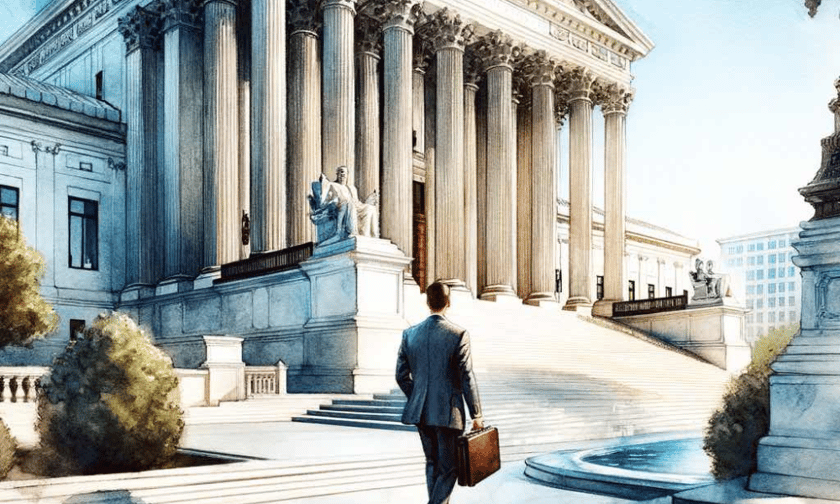

During a Supreme Court session on Tuesday, justices appeared to lean towards granting insurers a significant role in bankruptcy cases, during a dispute over asbestos injury claims. The discussion revolved around an appeal by Farmers Insurance Group company Truck Insurance Exchange, which is challenging a settlement proposed by Kaiser Gypsum in its Chapter 11 bankruptcy reorganization plan. This case could set a precedent affecting future mass tort bankruptcies, where large settlements are often supported by insurance funds.
Kaiser Gypsum, a manufacturer of building materials, has proposed a bankruptcy plan to establish a $50 million trust for individuals claiming that exposure to asbestos in the company’s products led to their cancer. This fund would be largely supported by the company’s insurance policies. Truck Insurance Exchange has raised objections to this plan, arguing that it lacks measures to eliminate fraudulent claims and minimize the insurer’s financial burden.
In the courtroom, the justices questioned Kaiser Gypsum’s stance against allowing insurers to contribute to the bankruptcy discussion. Justice Amy Coney Barrett expressed confusion over Kaiser Gypsum’s resistance, asking, “Why do you want Truck to not even be heard? What is your motivation to be fighting this so hard?”
“Who’s protecting the insurer?” Justice Sonia Sotomayor asked. “If the insurer can’t protect itself because you say it can’t go to the bankruptcy court, how is it being heard?”
Justice Neal Gorsuch highlighted the distinction between voting rights in a bankruptcy plan and the broader right of stakeholders to participate in the bankruptcy proceedings, affirming that stakeholders may not have a vote, but should be heard on any issue.
Kaiser Gypsum’s lawyer, Jones Day’s Kevin Marshall, defended the company’s position, arguing that continuous objections from Truck threatened to disrupt the bankruptcy settlement, potentially hindering the company’s ability to compensate individuals harmed by its asbestos-containing products. David Frederick, representing the asbestos victims, stressed the importance of preventing endless objections that could derail the bankruptcy process, noting that delays benefit insurers by postponing payouts.
Justice Ketanji Brown Jackson raised concerns about potentially opening the floodgates to limitless stakeholder participation in bankruptcy cases. In response, Truck’s attorney, Allyson Ho, asserted that as the primary financier of the proposed settlements through insurance, Truck Insurance Exchange had a critical stake in the bankruptcy proceedings. Lower courts had previously determined that Truck’s objections could not prevent the execution of the bankruptcy plan, as the settlement does not modify the rights under the insurance policies sold by Truck to Kaiser Gypsum.
The US Department of Justice’s bankruptcy watchdog supported Truck’s petition, arguing for the right of stakeholders and potential stakeholders to be heard on any issue arising in a bankruptcy case. This ongoing debate over insurers’ roles in bankruptcy is crucial, especially given the recent uptick in mass tort bankruptcy cases, such as those involving the Boy Scouts of America and several Catholic dioceses. George Singer, a bankruptcy attorney not involved in the case, noted the significant impact this case could have on similar large-scale tort cases.
Background
Truck Insurance Exchange was the primary insurer for the debtors from the 1960s through the 1980s, responsible for defending and indemnifying them against all asbestos-related personal-injury claims from that period, regardless of the claims’ validity. These insurance policies, which are not affected by the policyholders’ bankruptcy or insolvency, typically have a coverage limit of $500,000 per claim after deductibles, excluding punitive damages but without aggregate limits. This means Truck has to cover every eligible asbestos claim, a commitment confirmed after two decades of coverage litigation, making these policies a key asset for the debtors.
The insurance policies include a standard “Assistance and Cooperation Clause,” requiring the debtors to cooperate with Truck in legal proceedings and settlements. Since 1978, the debtors have faced over 38,000 asbestos-related lawsuits, leading to significant financial liabilities, including millions owed to Truck in deductibles. In response to this, the debtors filed for Chapter 11 relief in 2016, negotiating a Plan of Reorganization with various stakeholders, including Truck. This plan aimed to settle all liabilities, including a $50 million trust funded by Lehigh (formerly Heidelberg Materials US, Inc.) and the debtors for asbestos claimants, with rights under the Truck policies assigned to the trust. This plan was designed to allow claimants to continue pursuing insurance through the tort system while protecting the debtors from further claims with a channeling injunction.
However, the plan received unanimous support from all parties involved except Truck, which proposed its own plan, ultimately rejected by the Bankruptcy Court as unconfirmable and not in good faith. Truck later sent a reservation-of-rights letter to the debtors, alleging collusion and a breach of duty to cooperate due to the plan’s failure to require certain disclosures for claimants continuing to pursue claims in the tort system. To counter Truck’s threat, which risked derailing the plan, the debtors amended it to include a finding that their conduct did not violate the Truck policies, aiming to prevent Truck from relitigating the debtors’ bankruptcy conduct in future lawsuits.
Got a view on self-driving trucks and the potential insurance impact? Share your thoughts in the comments below.
